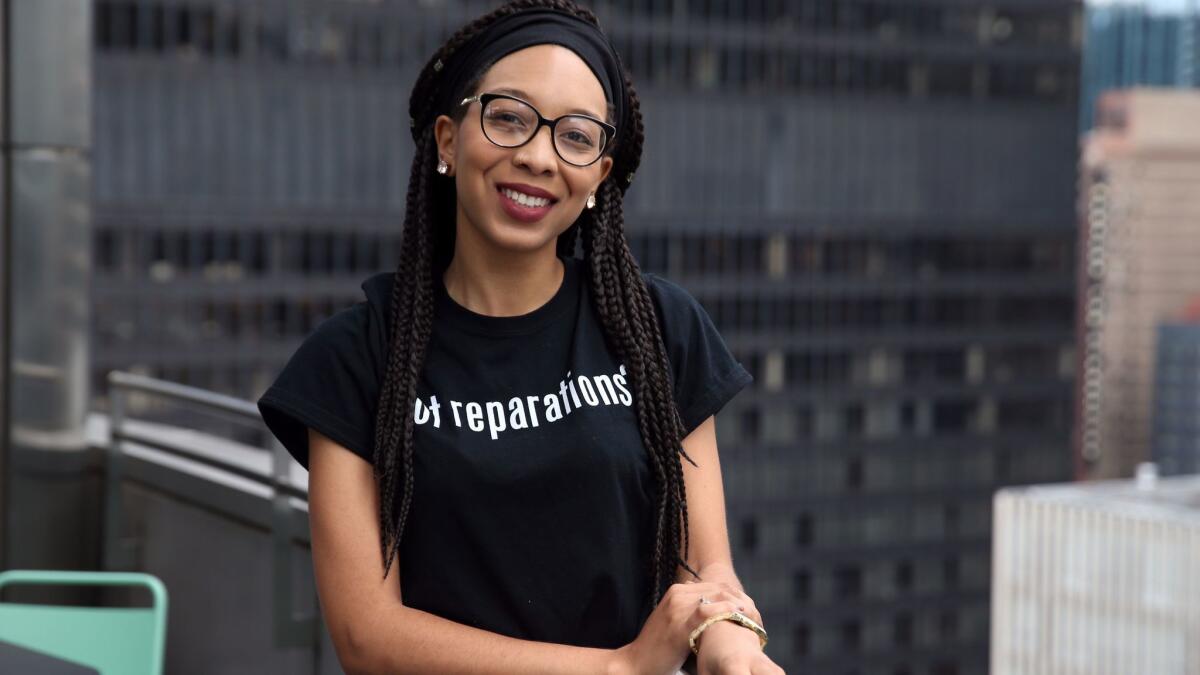Q&A: Why it’s harder for African American women to report campus sexual assaults, even at mostly black schools

Chardonnay Madkins knows firsthand the pressures African American women can face when reporting campus sexual assaults.
She says she was assaulted in two separate incidents, once at a mostly white college and another time at a historically black college.
In reporting the assaults, Madkins says she endured similar efforts — some subtle and some overt — to persuade her to back down rather than lodge a complaint against a fellow black student.
Now as project manager for the advocacy organization End Rape on Campus, Madkins, 25, is working to bring more attention to the role race can play in the handling of campus sexual assaults, and the distinct difficulties black women can face.
She is also preparing to launch Centering the Margin, a program that will help school officials and students recognize how sexual assaults can affect members of marginalized communities differently.
The Los Angeles Times spoke to Madkins about her work. Her responses to The Times’ questions have been edited for length and clarity.
Do black women have a harder time dealing with and reporting sexual assault than white women?
Yes. Part of that is because [of] where black women are, compared to white women, in terms of being accepted into college and accessing resources and stuff like that.
Another thing is the narrative around sexual violence largely focuses around straight, cisgender [non-transgender], white women. So if you don’t really fall into that category, you don’t really have as much knowledge about sexual violence against your particular community.
Another barrier is that most likely their perpetrators are men of color, specifically black men. Especially on college campuses and historically black colleges and universities, there are subtle pressures from the [black] community.
It tells these black women to remain silent because the education of their perpetrator is essentially more important than their education, and that [they] can’t be another person who sends a black man to jail. [Women are told:] “These are the few black men who were able to make it to college and you trying to report them is going to hinder their success.”
So when you stack all of that on top of the great disconnect between the black community and law enforcement, that’s enough for black survivors to not feel comfortable reporting their sexual assault.
Where does that pressure to stay silent come from?
That comes from not only the overall black community, but also these individual campuses [and students]. ... They’ll tell you to not really speak out about it, to keep it a secret. They’ll say: “Well, it doesn’t mean you have to necessarily tell the school or tell the police or do one or the other. Or maybe you’re the one that misinterpreted what happened.”
When it comes to ... sexual violence that is perpetuated against them by black men, that’s a very hard case to prove. Other people might not know that [black men] essentially have the help and support of the overall black community because of how black men are placed. They’re the highest part of the social hierarchy within the black community. They already know that everything is going to be twisted and turned into their favor.
How does that make a black woman survivor feel?
I think that makes them feel really isolated.
So black women often receive less support than others?
At least in my experience, being a survivor on campus, I kind of lost all of my community there when I did come forward.
I think that depends on what environment your campus is going through. I know when I was assaulted, these conversations [about sexual assault] were not happening on my campus at all, so I believe that is one of the reasons I didn’t have as much support from — not only the general campus overall — but especially from the black community.
But once I was at the historically black campus, [after the second assault], I still saw that same kind of reaction from all the black women on campus.
What was their reaction?
There’s this kind of negative, I guess, stereotype or idea that black women are just super strong and they can be super resilient. And sometimes that can be empowering. But when we’re talking about kinds of trauma and being able to have the space and ability to heal from that, black women aren’t really given that because they are seen as so strong. So on both campuses, and this is from people who I’ve regarded as very close, best friends of mine, they had that same reaction of, “You’ll get over it. You’re strong.”
Sexual violence and rape isn’t something to “get over.” That’s trauma. That’s something I have to live with and wake up to every single day.
Do you see a difference in how sexual assault reports are handled on historically black colleges versus predominantly white campuses?
On historically black colleges and universities, race does play a major part, just like how race plays a major part on predominantly white campuses. The only thing is that there’s this idea that if you come from the same kind of racial background or if you’re another person of color, that you can’t technically discriminate against somebody based on their race.
It’s very clear if you’re on a predominantly white campus and someone dismisses your claim because they say that you’re a black woman and sexually promiscuous, you can say easily OK, that probably plays into the kind of stereotypes.
On a historically black college or university, we have usually very conservative older black people who don’t say the same things. But because that kind of sentiment is coming from another black person, that’s when people have a hard time being able to wrap their heads around [it], still perpetuating this ultimate discrimination.
So even black campuses perpetuate some of these racial stereotypes?
Right, right. These are just microcosms of the larger society, so because we have sexism, racism, classism, etc., in overall society, we’re seeing this on a smaller scale on these campuses. Historically black colleges and universities are not different and they’re not immune to that. If anything, to a certain extent, when it comes to their reputation and image, they try to overcompensate in the sense of covering up all negative kind of publicity from coming out because of the overall systemic racism.
How does an incident of sexual assault being reported affect their reputation?
Just the negative publicity. That’s going to perpetuate the idea — or this is what they say — that all black men are rapists and you can’t really send your children to a school that is predominantly black because these are all the bad things that are happening on these campuses [or] it’s not safe. I think that schools are really, really scared of that.
How does that affect the way they handle sexual assault cases?
In some instances, that means that they will discourage survivors from reporting, or doing things to discourage survivors to continue forward with their report.
What do you think is the solution for this?
Just start having these conversations at younger ages. And within the black community.
When we’re talking about things like police violence or other kinds of inequalities within our community, that we are also inclusive of the inequalities more marginalized black people experience, like black women — black cis[gender] and transgender women — black LGBTQ, black incarcerated folks and black people with disabilities, because those people are just as equally important to our community and important to ending the problem.
Because it deals with sensitive racial issues, do you think that makes it harder to have a conversation?
I don’t think it makes it harder. I think it makes it so people don’t want to listen.
We understand that when we’re saying these things that it makes some people uncomfortable. What we hear a lot, or at least previously heard a lot, is that if we’re talking about sexual violence, then we just want to talk about sexual violence and we don’t want to talk about racial issues or gay rights issues or anything else because this is the topic we’re focusing on and everything else is divisive.
I think those responses are the reason why we’re still where we are today. These issues don’t happen in a vacuum and when there are people who live at these intersections, it is most important to not only talk about these issues, but center them.
Twitter: @LRosenblatt_
ALSO
Violence breaks out at Berkeley protest
Education Secretary Betsy DeVos kicks off emotional battle over campus sexual assault rules
Editorial: Hey, Betsy DeVos, keep your hands off campus sexual assault standards
More to Read
Get the L.A. Times Politics newsletter
Deeply reported insights into legislation, politics and policy from Sacramento, Washington and beyond. In your inbox three times per week.
You may occasionally receive promotional content from the Los Angeles Times.






